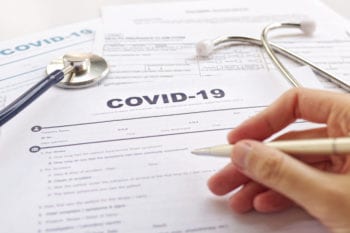
The most devastating part of the global COVID-19 pandemic is behind us. But the new disease is still circulating, mutating, and causing illness and deaths. World travel has fully resumed, and most governments have lifted restrictions. Many people today are again shopping, eating in restaurants, attending concerts and flying, with barely a mask in sight. The worst danger may have passed, but it’s still important to be prepared and protect yourself, whether traveling or living abroad. After all, COVID-19 hasn’t disappeared, and it’s possible that other novel diseases will appear on the global scene.
Expatriates living abroad when the pandemic erupted were often unsure whether their global health insurance plan covered COVID-19. These days, many policies cover expenses related to COVID-19 just like any other communicable disease. It’s still important, however, to check your current policy or ensure the policy you choose includes COVID-19 coverage.

The most devastating part of the global COVID-19 pandemic is behind us. But the new disease is still circulating, mutating, and causing illness and deaths. World travel has fully resumed, and most governments have lifted restrictions. Many people today are again shopping, eating in restaurants, attending concerts and flying, with barely a mask in sight. The worst danger may have passed, but it’s still important to be prepared and protect yourself, whether traveling or living abroad. After all, COVID-19 hasn’t disappeared, and it’s possible that other novel diseases will appear on the global scene.
Expatriates living abroad when the pandemic erupted were often unsure whether their global health insurance plan covered COVID-19. These days, many policies cover expenses related to COVID-19 just like any other communicable disease. It’s still important, however, to check your current policy or ensure the policy you choose includes COVID-19 coverage.
Coronavirus (COVID-19) and Global Health Insurance
As health insurance brokers, we work with thousands of expatriates and international citizens every month. They come to us with questions, and they require a medical policy for a variety of reasons. But every expat needs health insurance covering COVID-19 if they want complete, high-quality health protection for themselves and their families.
Below, we’ll mainly focus on international health insurance policies. Such policies provide comprehensive medical benefits and are annually renewable, and they are not the same as travel insurance plans. We’ll touch on travel insurance and COVID-19 briefly, but these policies cover medical costs differently from global policies.
Is COVID-19 Covered in an International Health Insurance Plan?
The short answer is yes. Unlike with trip cancellation insurance, a pandemic is not a general exclusion — or automatically not covered — under medical benefits. However, the safe answer here is that it depends on the plan. Some plans are comprehensive, and some have exclusions. Therefore, the best solution is to check with your agent or review the terms of your policy to be sure.
“An agent is crucial in the process of choosing an insurer and finding the right coverage for your specific needs,” says Joe Cronin, President of International Citizens Insurance. “An expert broker can answer your questions about global health plans - even some you may not realize you had.”
However, as a rule of thumb, if you work with one of the major insurance companies like Cigna Global, GeoBlue, or William Russell, these plans will most likely treat COVID-19 illness like any other illness and offer coverage up to your regular benefit limits. That means you will be covered for the Coronavirus in the same way you would be treated for the flu or a cold. As long as you purchased a plan with inpatient and outpatient coverage, your plan should cover your COVID-19 treatment.
Recommend Plans with COVID-19 (Coronavirus Coverage)

Cigna Global Insurance Plan
- The flexibility to tailor a plan to suit your individual needs
- Access to Cigna Global’s trusted network of hospitals and doctors
- The convenience and confidence of 24/7/365 customer service

William Russell Health Insurance
- William Russell plans cover you internationally, both in the country you reside in and wherever you are traveling to (addons required for USA)
- Their network includes 40,000 hospitals around the world.
- Plans have comprehensive cancer coverage, including genome testing.
Best Plan for US Citizens Living Abroad or Expats Moving to the US

Xplorer Worldwide Medical Plan
- Premium Benefits, Coverage and Service
- Define your deductible and prescription benefits
- For Foreigners in the US or US citizens abroad
How Does the COVID-19 Coverage Work in My Global Health Plan?
Ask your insurer (or us) the following questions about COVID-19 coverage in your global health insurance plan.
Does My Health Insurance Cover COVID-19 Related Treatment Costs in Full?
This is a fundamental question to ask, and the answer might depend on your current plan and its benefits. If you already have a co-pay for inpatient or outpatient treatment, your insurer might include COVID-19 treatment in that category. Most reputable insurance companies were covering the treatment costs related to the novel coronavirus in full during the emergency declaration. However, many have transitioned to treating COVID-19 like any other disease.
Will COVID-19 Related Costs Be Deducted From My Annual Benefit Limit?
This is a natural follow-up question to the one above. It's important, as the costs might be high in the case of antiviral treatment, hospitalization or complications like long COVID. If the answer is no, consider increasing the overall medical benefit limits in your plan during your renewal period.
Does My Global Insurance Plan Cover COVID-19 Testing?
Your global medical plan will probably cover the cost of testing if you get a doctor to certify your symptoms. GeoBlue, as an example, provides "coverage, with no cost-share, for diagnostic testing for the virus, known officially as COVID-19, consistent with U.S. Centers for Disease Control (CDC) guidelines."
Most plans, however, will not cover a COVID-19 test if you are asymptomatic, unless you have a confirmed exposure. Another common exclusion is when a hospital requires a negative COVID-19 test before an unrelated, or not covered, medical procedure.
Are There Any Location or Age-Related Limitations to my COVID-19 Coverage?
Check with your insurer or broker to see if there are any policy limitations. For example, some plans exclude coverage outside of your primary location, or in specific areas of the world. If you need to travel abroad frequently, make sure your coverage is genuinely worldwide.
Another common limitation might be related to age. Some insurers might exclude COVID-19 coverage to the elderly, so make sure you’re in the age brackets that receive coverage.
How Can I Receive Medical Care During a Lockdown?
While lockdowns are far less frequent than they were in the height of the pandemic, you should raise this question with your insurer. If you are in lockdown, how can you contact a doctor and get tested? Will you need a pre-authorization from the insurer for testing and treatment for COVID-19? Especially if you’re living abroad in a country where more stringent restrictions were in place, you should find out in advance what to do if your location locks down again.
How to Access Doctors and Hospitals Through an International Health Insurance Plan
How do international clients access healthcare or get a doctor's referral for testing without leaving home? One option that international insurers are offering is telemedicine. One insurer, Cigna Global, offers Global Telehealth services, which gives customers access to licensed doctors around the world for non-emergency health issues. Telemedicine provides access to an insurer’s global network of doctors by telephone or video without needing to leave your home.
Make sure your plan has the telemedicine option covered or ever offered for free in your plan. This is the safest and quickest way to "see" a doctor, via telephone, video, or chat. If necessary, you can get a referral to get tested or visit the nearest hospital.
Read More: Finding an International Doctor
Does My Global Health Insurance Plan Cover the COVID-19 Vaccine?
Similar to other vaccines, coverage aligns with governmental and health declarations and specific plan coverage. Some private providers charge individuals for the vaccine and its administration, but depending on where you are, you may still be able to get a vaccine for free.
Cigna Global suggests that as a general rule, you should check your specific policy documentation to determine if vaccination cover is available. If so, coverage of the COVID-19 vaccine should align with the coverage included for any other preventative vaccine.
Will My Travel Insurance Cover COVID-19?
The short answer is, it depends. If you’re looking for short-term medical coverage for your trip overseas, you should discuss your travel insurance options with your broker.
If you have a travel medical insurance plan, you should be covered for a doctor’s visit or a hospital stay, depending on your plan restrictions. However, travel insurance companies may not cover you if you’re visiting countries with a Level 3 or higher travel advisory in place that’s related to COVID-19. Before booking your travel, check your home country’s advisory for your destination.
If you purchased trip cancellation insurance, you should check to see whether your policy covers disease outbreaks. It may be best to contact your airline and lodging accommodations to find out if they have any policies in place as well. If you purchase Cancel For Any Reason insurance, you’ll definitely be covered. But this has to be purchased at the time of your trip deposit, so if you want to be extra-safe, be sure to get this add-on when you’re planning your trip.
Get the Right Insurance Plan for Your Needs
For more information about health insurance plans and pricing, feel free to contact us directly to get a free quote and plan comparisons. You will be matched with one of our agents who will answer all your insurance questions and ensure you are getting the coverage you want.
Related:
